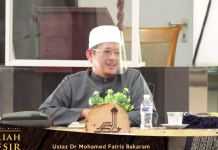بسم الله الرحمن الرحيم
Bismi-llāhi r-raḥmāni r-raḥīm
In the name of Allah, Most Gracious, Most Merciful
اللهم صلي على سيدنا محمد وعلى اله وصحبه وسلم
Allahumma salli ala Sayyidina Muhammad wa ala alihi wa sahbihi wasallim
O Allah, send your peace and blessings upon our Master Muhammad and upon his family and companions
Discussion of Issues Raised from Surah An-Nur (Verse 3)
This article is a summary of takeaways from Ustaz Dr Mohamed Fatris Bakaram’s Tafsir Online Lecture on 6th December 2020. Summaries of previous lectures on Surah Maryam, Surah Taha, Surah Al-Anbiya’ and Surah Al-Hajj can be found here. The previous lecture of Surah Al-Mu’minun can be found here.
Overview of Surah An-Nur
In the past two lectures, we have ventured deeply into the story and interpretations of Verse 3 of Surah An-Nur. I mentioned that there is in fact another story linked to Verse 6, and that before we venture into that story, we will first go back to the start of the Surah and cover the verses before verse 6.
This will help us build a good understanding of the context of the verses revealed. I will first do a big-picture overview of the whole Surah. Surah An-Nur was revealed after the Hijrah (migration) of Rasulullah SAW and the Muslims in Makkah to Madinah.
This is evident seeing that Marthad in the previous lectures, had a mission of rescuing the Muslims trapped in Makkah and bringing them safely to join the Muhajirun in Madinah.
Where the Surah gets its Name
Why was this Surah called Surah An-Nur? The name was given because there is a verse in the middle of this Surah that speaks about Nur – light.
۞ ٱللَّهُ نُورُ ٱلسَّمَـٰوَٰتِ وَٱلْأَرْضِ ۚ
Allah is The Light of the heavens and the earth… [24:35]
There are 64 verses in this Surah. The verse on Light is about 4.5 pages from the start and the end of the of the Surah, so it is right in the middle of it. The ‘Light Verse’ is particularly important for people who look to the Qur’an for matters of the soul, for issues regarding Tasawwuf, issues regarding the intimate and beautiful relationship between a servant and His Lord.
This is the verse that is known to deal with those issues. It speaks about Allah SWT being the Light of the heavens and Earth, giving a parable about the light that shines… we will cover this when the time comes later insyaaAllah. So this is where the Surah gets its name. But if you look closely, you will realise that Surah An-Nur does not only speak about God. It does not only speak of issues of the heart, tasawwuf, tarikat etc.
The Themes in this Surah
If you look at the first half of the Surah, Verses 1 to 34 deal with issues regarding the human being’s relationship with fellow human beings. Now if you remember, we went through Verse 3 which speaks about the status of someone who commits Zina.
What are the topics covered in this first half? Here are a few: the ruling for Zina, the status of someone who commits Zina, accusing someone of Zina, Li’an (the act of a husband accusing his wife of Zina), slander of Zina (al-Ifk), self-purification, dignity, honour, self-worth, protecting one’s gaze, entering someone’s home, the adab of being a guest, protecting one’s tongue.
These verses show us that even before Allah SWT speaks about light, it is important that human beings look at themselves. How noble is their heart, how pure is their spirit, how fine is their nafsu (desire), how firm is their belief? All of these are important to look at.
How a human being is in his community and how he views others are essential factors. People should think well of others, not be overly suspicious of other people, because this leads to spying, gossiping, slander and baseless accusations. All of these need to be completely wiped away from the human being’s character and deeds.
Only then, does Allah SWT introduce Himself as Light. In the second half of the Surah, after this verse, we hear about the Greatness of Allah SWT, stories of believers and disbelievers of Allah SWT, verses relating to the Day of Judgement and so on so forth. And we will see later in verse 58 to 61 that brings with it once more, the themes of dignity, self-worth, adab etc.
So even though the ‘Light Verse’ is key to the naming of this Surah, the major theme in this Surah is in fact the human being – its worth, purity, and preservation. The ‘Light Verse’ is essential. But more than that, we need to know that Allah SWT is Light, and to get that light, we need to look at ourselves as human beings.
So in our quest for Nur, do not become someone who is self-absorbed or full of yourself. You want to be someone who is pure and of high status, someone close to Allah SWT – that cannot be achieved if we do not maintain our adab amongst ourselves and protect the dignity of one another as believers.
Verses Explained
I do not intend to go through in-depth every single verse of Surah An-Nur, verse by verse. These are not general Tafsir lectures; this lecture series focus on stories behind the verses of the Qur’an. If you are interested, I encourage you to read up on them, as a means of getting close to Allah SWT and in seeking guidance and aid from Him SWT. Now let us look at the first two verses:
سُورَةٌ أَنزَلْنَـٰهَا وَفَرَضْنَـٰهَا وَأَنزَلْنَا فِيهَآ ءَايَـٰتٍۭ بَيِّنَـٰتٍۢ لَّعَلَّكُمْ تَذَكَّرُونَ
(This is) a surah We have sent down and made obligatory: We have sent down clear ayaat in it, so that you may take heed. [24:01]
The Role of the Qur’an in our Life
So, these verses were revealed not just for us to read them and then exclaim that all is well. The word ‘Fa-ra-dho’ is used which carries the meaning of being ‘made obligatory’, ‘determined’, and ‘commanded’. This same root word is used for the word ‘Fardh’ which is used to refer to things that have been commanded by Allah SWT.
Allah has sent this verse as an ordainment upon us. The Qur’an is not meant to be recited once and then set aside until the next Ramadhan comes. It is not just meant for us to recite to get Hasanaat and then to shelve it back. The Qur’an should not be made to gather dust on display until someone dies and we take it down to recite some verses for them. Do not have the Qur’an at home without using it as a handhold and a guidance through life.
Allah SWT wants us to reflect upon the verse of the Qur’an, not just of this Surah but of the whole book. Let it be a point of reflection, something to ponder upon, something you do not leave behind and forget.
This is Surah An-Nur; A Surah that was revealed and ordained upon us, sent as a clear evidence and for us to reflect upon so that we may think and act upon it. These verses are not too abstract or philosophical for us to understand. Allah tells us that they are clear verses. What is important is that you make them an object of remembrance.
May Allah SWT cleanse and purify our hearts. May He open the doors of our chest. May He make beautiful our Iman, so that we may become servants of Allah SWT who want to reflect and think about Allah SWT’s revelation and use His Book as a guidance through life. May we be amongst the believers who do not disregard the Qur’an or set it aside. May we hold tightly onto His Book for the whole of our life. Ameen.
The Gravity of Zina
What are the contents of Surah An-Nur? The first theme that is spoken about is self-respect – dignity and honour. It is about purity of the self.
ٱلزَّانِيَةُ وَٱلزَّانِى فَٱجْلِدُوا۟ كُلَّ وَٰحِدٍۢ مِّنْهُمَا مِا۟ئَةَ جَلْدَةٍۢ ۖ
The fornicating woman and the fornicating man—whip each one of them a hundred lashes… [24:02]
A hundred lashes of the whip or cane was not a light punishment. This punishment reflects how Zina is something that is truly loathed and scorned upon by Allah SWT. Zina is such a grave sin that if someone who commits it does not repent before their death arrives, then they will have secured for themselves a place in the Hellfire on the Day of Judgement.
وَلَا تَأْخُذْكُم بِهِمَا رَأْفَةٌۭ فِى دِينِ ٱللَّهِ إِن كُنتُمْ تُؤْمِنُونَ بِٱللَّهِ وَٱلْيَوْمِ ٱلْـَٔاخِرِ ۖ
… and let no compassion towards them keep you from carrying out Allah’s religion if you (truly) believe in Allah and the Last Day … [24:02]
The word ‘Ro’fah’ means ‘gentleness’. So do not let your desire to be gentle to them stop you. Be firm when executing the punishment. An offence like Zina should not be taken lightly. There is no pity in punishment.
The scholars have done extensive debates and research onto the rulings behind Zina. I do not think we will have time to investigate the arguments, opinions, and supporting evidence presented on this topic. These are discussions left in the Fiqh Books. All we need to know here is that Zina is a deed that is a profoundly serious offence. In another verse, Allah tells us:
وَلَا تَقْرَبُوا۟ ٱلزِّنَىٰٓ ۖ إِنَّهُۥ كَانَ فَـٰحِشَةًۭ وَسَآءَ سَبِيلًۭا
And do not go anywhere near adultery: it is an outrage, and an evil path. [Surah Al-Isra’, 17:32]
Zina is so heinous that we are not forbidden from committing it, we are forbidden from even coming close to it. In Verse 2 of Surah An-Nur, the seriousness of Zina is highlighted by the punishment laid out of a hundred whips to each perpetrator.
The Definition of Zina
What is defined by Zina according to the scholars is clear. Physical touch between a non-mahram man and woman is not considered Zina, even though it is Haram. What is the extent of intimacy that brings about such a punishment? Physical touch, exchanging glances, embracing one another, entering a privately enclosed dark room… all of these are not considered Zina.
What is specified by the scholars as Zina is when the male sexual organ enters the female sexual organ. This is what is described by scholars in Fiqh books with the euphemism ‘when the kohl stick enters the kohl container’. Kohl, or eyeliner, used to come in the form of a fine powder stored in a container. So, this is the metaphor used to describe the definition of Zina. Anything less than that is not considered Zina.
Who Punishes the Person who Commits Zina?
I mentioned in the last lecture that when it comes to Fiqh rulings, scholars do not just look at what is said or written in a single Verse or Hadith. They do not just look at the literal meaning or translation of the words in the text. They do research and come up with evidence to find a conclusion that works.
So, when it comes to the ruling of whipping someone who commits Zina with a hundred strokes, scholars have decided that this is something that is the responsibility of the governmental authority of the land. This penalty cannot just be carried out by anyone from anywhere.
Even the head of the household is not permitted to execute this punishment upon his family members. Zina is one of the punishments defined in the Qur’an, and its execution is the responsibility of the authority that oversees penalising crime in the land.
There is a difference between Fardhu Kifayah and Fardhu ‘Ain. A law such as “establish your five daily prayers” is one that is Fardhu ‘Ain. It is compulsory upon every single person to pray. Whoever does not do so is accountable for their own sin. This applies to praying, fasting in Ramadhan, Zakat, and Hajj.
There is also Fardhu Kifayah, something that is made compulsory upon a community that, if done, the whole community is absolved of sin. And if there is not a single person in the community who does it, then the whole community will be accountable for their sin. There are also some things that are made compulsory only upon a few people. Hudud, for example, is the responsibility of the ruling authority to carry out.
Must the Person who Commits Zina be Whipped?
When this law is being carried out, there is no longer any pity to it. If Allah says 100 whips are to be applied, then 100 whips will be executed. There are no halfway attempts. What we say is that in the execution, whoever is in charge needs to act upon the Maslahah (the good that it brings).
Scholars have discussed this extensively. They do not just come across a verse and immediately rush to execute it, accusing leaders and the authority of sin if they do not carry them out.
Rather, scholars study how it should be carried out, when and where it should be implemented, using what methods and under which circumstances etc. Scholars declare that when something becomes compulsory upon a ruling authority, then their actions need to be based upon Maslahah.
In the Islamic Method, there is a principle that means ‘the actions taken by a leader need to be done to fulfil the Maslahah of the community’. I mention this because a leader needs to make decisions looking at the present contexts.
Sayyidina Umar RA said that when he became a Khalifah, he did not carry out every single ruling that Rasulullah SAW commanded. This was not because he was rejecting the Prophet SAW’s teachings or because he disagreed with the commands. Rather, Umar as a Khalifah showed an example to us. He was amongst the Khulafa’ Ar-Rashideen, the leaders after Rasulullah SAW who were guided by Allah SWT.
Rasulullah SAW had advised us to follow his Sunnah and the Sunnah of the Khulafa’ Ar-Rashideen, the leaders that came immediately after him SAW. Yet Sayyidina Umar RA held onto the principle that in carrying out his responsibility as the ruling authority, he cannot just look at the commands in the Qur’an literally just as they are.
A leader must look to see if it is suitable to be making such a decision, and whether the circumstances and surroundings are suited for such a ruling. A leader must look at the state of the community, the country, and the nation. He must decide if it is best to implement the ruling now or to wait for a more appropriate timing.
A famous example in that one time, Umar Al-Khattab delayed the punishment of someone who was caught stealing. He was supposed to have his hand cut off, but Umar did not do it immediately. He saw that at that time, it was a period of famine. People were dying of starvation. So, there were people who stole out of desperation, they encroached upon the rights of others to fulfil their basic needs.
Umar did not punish the thieves. He RA saw that the timing was not appropriate for such a punishment. This is the principle that scholars and leaders hold onto when it comes to enforcing laws. When implementing a penalty as an authority, one needs to see whether such a penalty would bring about Maslahah or Mafsadah (harm or destruction).
Following the Law of the Country
For example, we read this verse. In Singapore right now, with the present reality, in our current condition and circumstances… can we really carry out such a law? Who executes the law? Is it the President? No, that is not how our government works. This nation is not run by the rulings stated by Allah SWT.
This lecture is not the place to discuss regarding matters of legality. But I want you to be aware that just because you learn this verse, does not give you the right to go around wanting to execute this law for yourselves.
Some people might say, “How can we follow the law of disbelievers when clearly the law of Allah states what is right and what is not?”. Scholars of the past, who lived in the Muslim empire – amongst Muslims under Muslim rulers – even they discussed the “law of Allah” and made decisions based on what should and should not be carried out. Imam Al-Mawardi in the book ‘Al-Ahkam Sultaniyyah’ for example, laid out many rules and principles that rulers should follow in carrying out their roles.
In our religion, there are Fiqh Rulings and there is the Syariat (Jurisprudence). There are ways in which the rulings in the Qur’an and Hadith are translated into laws that are implemented by a people. Some rulers base their laws on the Qur’an and Hadith, other base them upon other things.
When something becomes a law, that is the standard that is implemented, because that is what has been selected specifically for that people, in that country, at that point of time. Do not be too eager to implement the “law of Islam” and ignore the local legislation. There is a process of the codification of law that is conducted by many scholars before it is implemented by the leaders of a community.
Not following the laws of the Qur’an does not make us any less of a true Muslim. Islam is expansive. We have other responsibilities. The process of obeying Allah sometimes requires several stages to be met before the next stage is reached. In understanding the laws of Allah, we need to understand that at times there is the concept of ‘Nasikh and Mansukh’.
Some rulings have been revealed, and then Allah reveals a new verse to override the previous ruling. This is not because Allah SWT has changed his mind, or that He SWT was not aware that the first ruling was not going to be suitable. Rather, Allah SWT has arranged for the revelation to come out of His infinite Wisdom.
Some people think that Mansukh means that the initial verses can be completely ignored and disregarded, we just need to accept the ruling that follows at the end. Scholars say that it is not as simple as that. Allah SWT shows us that there are phases to go through in executing the law. Some places and communities are just not ready to follow a certain set of rulings, and so those rulings cannot be implemented.
When looking at the law, we look at this country, this people, and this present context. We learn this verse to see that Zina is truly something detested by Allah SWT, such that if the situation had allowed for it, the ruling authority could in fact implement such a severe penalty on the perpetrators.
What Can We Do Since Hudud is Not Practiced?
As present conditions do not allow for it, we do what we can in response to this verse. We should educate the community, make the younger generation understand, inscribe it deep in their hearts of the severity of relations outside of Nikah.
Zina has the potential to destroy communities and devastate the spirit of Islam, Iman and Taqwa in the hearts of our people. Hudud may not be able to be implemented in today’s context, but the process of education must continue going.
We want to be able to reach a point of time when our community no longer encounters children born out of wedlock. The present rates are extremely high in our present day – it is worrying and embarrassing to see such numbers! How do we solve such a problem?
Protesting on the streets demanding the Hudud be implemented will not solve anything. If the community is not ready, if religious awareness has not yet flourished, if the desire to want to live with Taqwa has not yet blossomed in the hearts of the members of our community… then having the Hudud law in place will not make any difference.
One of the principles in the religion is that if we cannot carry out all of it, it does not mean that we do not carry out any of it. We cannot say that just because the Hudud law cannot be implemented, anything goes.
We do not let Zina and children born out of wedlock become commonplace just because it is not being penalised by Hudud. Perhaps someday, when circumstances are suitable, such a law can be implemented. Until then, there are certain steps that we can put in place until we arrive there.
What is important is to see how we preserve our dignity, self-worth, and self-purity. Is this not something worth working towards? We as a community want to be instilling beautiful morals in the hearts of our future generations, such that someday we will have a community that even without the Hudud in place, sees Zina as a problem to be eradicated and a deed that is to be avoided at all costs.
This is the ideal community that we want to have. Would that not be the best thing to have – when good deeds are done out of consciousness and bad deeds are avoided out of penitence – and not out of fear for the set penalty. There are many people who go in and out of prison, even living their last days in prison, and they die without a drop of penitence in their hearts.
Does Hudud Mean That Islam is a Cruel Religion?
The next issue that is raised is that people say, “Oh, Islam is such a brutal and violent religion! How can you have 100 whips of beating being given and pity or compassion being forbidden?”. People say that when someone is whipped or caned in the present law system, their flesh becomes exposed and their skin tears at the first stroke.
Let us say that there is a crime right now and the perpetrator is brought to court where he is found to be guilty and sentenced to 10 strokes of the cane. Is there anyone who goes through all 10 strokes all at once?
If someone were to be caned 10 strokes all at once in today’s world, that person would have died! That is why what usually happens is that the person is caned twice or thrice at once and then the caning stops. They will resume at another session until the stated penalty number is completed.
What then would 100 strokes be like? My brothers and sisters, pause for a while and look. There are specifications by Fiqh scholars telling us what kind of whipping is allowed in Islam.
The point of whipping is to raise a form of awareness in them of how serious what they have done is. This is meant as a reminder for the community so that they too avoid such an act. This is to disgrace the perpetrator because he has done something disgraceful. The aim is not to injure the perpetrator.
As such, even the cane being used has some criteria and specifications that must be followed – its length and thickness are predetermined. Fiqh scholars even specify which parts of the body can be hit, what kind of hits should be issued, and what kind of hits should be avoided. The cane/whip cannot be a baseball bat. The person caning is trained on when to stop and when to restart the punishment. The aim is not to hurt the person.
We are not speaking here about the punishment of Rajm (stoning to death) in Islam. There are specific Sahih Mutawwatir Hadith mentioning this penalty for those who commit Zina. I will not go deeper into this issue.
However, to mention briefly, this punishment is given to someone who is already married and has Halal means of fulfilling their sexual desires. They have been blessed by Allah SWT with a partner, and yet they seek what is Haram. There had been such cases even in the lifetime of Rasulullah SAW.
There is no Mercy upon these perpetrators, the punishment is stoning to death. In Verse 2 of Suran An-Nur, the intent of punishment is not death. The strokes of cane should not hurt the culprit, much less kill him. Hitting on the head and vulnerable regions, for example, is disallowed.
Islam is a religion where, when laws are conducted with severity, it terrifies some people and becomes a source of consciousness and realisation. Islam is not a religion that brings about harm and destruction to human beings – except for crimes that are the worst possible.
وَلْيَشْهَدْ عَذَابَهُمَا طَآئِفَةٌۭ مِّنَ ٱلْمُؤْمِنِينَ
… and let their punishment be witnessed by a group of believers. [24:02]
The whipping should not be done in a secluded or enclosed area. It should be observed and seen by people so that they can spread the word of the intensity of the punishment. Does this mean that the caning should be done on display in front of a wide audience of the public? Scholars differ in opinion on the interpretation of the verse “Tho’ifah”. The majority of scholars say that this punishment should be held in front of a small group of selected people.
In verse 3 previously, we discussed the status of someone who commits Zina. Allah tells us not to marry people who commit Zina. He says that the people who commit Zina are just as likely to marry someone like them.
May Allah SWT protect us, our family, our friends, and community from this heinous act. And for those who have committed Zina, we pray that Allah SWT guides them to penitence, and they leave behind whatever has passed. What we need to remember is that if we do know of people who have committed Zina in the past, do not mention their sin again. Do not mock them repeatedly.
In Islam, whenever someone makes Taubah, all their past sins will be wiped away completely. This is the kind of support that our brothers and sisters who may have transgressed need. When they commit a mistake, we give them advice. When they want to repent, we support them without bringing up their past mistakes again.
A Severe Penalty for the Accuser of Zina
وَٱلَّذِينَ يَرْمُونَ ٱلْمُحْصَنَـٰتِ ثُمَّ لَمْ يَأْتُوا۟ بِأَرْبَعَةِ شُهَدَآءَ فَٱجْلِدُوهُمْ ثَمَـٰنِينَ جَلْدَةًۭ وَلَا تَقْبَلُوا۟ لَهُمْ شَهَـٰدَةً أَبَدًۭا ۚ وَأُو۟لَـٰٓئِكَ هُمُ ٱلْفَـٰسِقُونَ
And the ones who throw (accusations) upon women whose chastity is guarded, (and) thereafter they do not come up with four witnesses, then lash them with eighty lashes and do not accept any testimony of theirs at all; and those are they (who are) immoral, [24:04]
In this verse, Allah SWT tells us clearly that the accuser is outcasted and punished, rather than the accused, in cases where unbacked testimony is given. A single accusation renders the accuser unreliable for the rest of his life. His word will never account for anything in the future and he cannot be trusted as a witness for anything.
Someone could swear by Allah’s name, claiming that it is true that he really did see the Zina being performed. However, for as long as there had not been four witnesses to confirm that the deed had been done, then he is not to tell anyone of what he had seen.
In Islam, we are taught that a believing man is a brother to another believer. A mistake that our fellow believer commits becomes our responsibility to hide. Whatever his faults and weaknesses may be, it is our responsibility to keep it to ourselves and not to share it with others. What more when it comes to the act of Zina.
Allah SWT is telling us not to spread the word if you have seen the sin being committed, because the punishment for such an accusation is heavy on the accuser. If you compare the punishment of the person who accuses someone of committing Zina with that of someone who actually commits Zina, you will notice that the punishment for the former is 80% of that of the latter.
The accuser can say, “How is this fair? I never committed Zina! I just saw it being done, I just let people know what I saw!”. However, the burden to carry because of an unbacked accusation is no joke. One should be careful before attempting such an act.
Allah SWT calls this group of people the ‘Faasiq’, they are people whose standing in Allah SWT’s eyes are very low. From the perspective of the law, they get 80 strokes of the cane. From the perspective of the community, they get ostracised and can no longer be trusted.
From the perspective of Allah SWT’s eyes, they are considered as Faasiq, a cruel person, someone who disobeys Allah SWT. So, what would you do if you see such an act? In Islam, seeing does not equal to accusing.
How Allah Makes it Impossible to Accuse Someone of Zina
Before you even think of accusing someone, you need to make sure that you have four witnesses. In Islam, not just anybody can be a witness. When we look at the local court system, when it comes to choosing a witness, we examine the witnesses to ensure that they are reliable.
Their word is questioned and the moment they say something that is untrue, nothing that they say after that can be taken seriously. This is in matters of this world, what more for matters of the hereafter – or in matters of the religion! In Islam, the witnesses have to be ‘Adil – the opposite of Faasiq – people who are obedient to Allah SWT.
Think about it, how often will you find yourselves in a situation where you catch someone in the act of Zina, and along with you are four believing men? Remember the earlier definition of ‘Zina’ that has been defined by the scholars? If you happen to catch a non-mahram man and woman entering a dark room together, that is still not counted as Zina.
Even if you and your friends see a couple hugging and kissing in public, that is still not counted as Zina. The act is only considered Zina when the male sex organ enters the female sex organ. For as long as you do not see that being done, you cannot say that you have observed Zina.
Under what circumstance would you have four witnesses to something like that? Zina usually occurs in private and enclosed spaces, not out in the open. We are not talking about pornography from Western cultures; we are talking about Muslims. No Muslim in the right mind would perform Zina even in front of another person, much less having four observers see the act of the private part being inserted into another.
Now let us imagine a situation when a witness goes to the court and brings his four witnesses to the stand, all of them claiming that they have witnessed the act of Zina. As a judge, the first thing I would do is to ask the accuser, “Where did you see this? What were you doing in her house? You have no business to be in the couple’s house with four witnesses!”.
Let us say that the accuser then says, “Oh we were just peeking at them and we saw the act being done!”. As a Judge, I would immediately discard the person’s testimony. Spying and peeking at your fellow brother, is an act that is Haram according to Allah SWT. As such, anyone who claims to have been spying, then he will be considered a Faasiq and cannot be counted as a witness!
In Surah An-Nur, immediately after the verses on Zina, Allah SWT tell us about the adab of visiting a house. When you want to enter someone’s house, seek permission. When you enter, there are certain things you can and cannot see. After you have been served food and eaten, leave and do not hang around to gossip. Basically, you do not have the opportunity to look around and peek into people’s rooms, even if they had invited you into their homes.
Now, remember that the condition for having seen Zina is that you see one private part being inserted into another. Think about it, the last thing that would be revealed would be a person’s private part. Before that, their clothes would come off first, their aurah would get exposed first.
A Soleh or ‘Adil person would have seen this and stopped looking. If he sees a woman taking off her hijab, he should not keep watching. If he sees a man expose his private parts, he should not keep watching. In order to see the private parts being inserted, you would have to have continued watching the whole process. How then can you still be considered a righteous person?
When Allah SWT lays out such pre-requisites, we can see that it is near impossible for such a situation to occur! You will never be able to find four credible witnesses to testify to such a deed. Allah is telling us that even if we were to witness something like this, the sin of our brother is not meant to be exposed. Remain silent, forever. Leave him to Allah SWT and pray that Allah SWT will move his heart to repent. It is not our role to accuse or expose anyone.
Closing Note: Recommendations
So that is a bit of a teaser into the next verse, before we end today’s lecture. I would recommend anyone who had the book Tafsir Al-Azhar by Professor Hamka should read what he has written regarding this verse. I find his writing truly beautiful with regard to this topic, Subhan Allah! He explains the characteristics of a ‘muhsonaat’ woman as well as the ideal culture of Muslims that is encouraged by Allah SWT.
May Allah SWT protect and preserve us. Sometimes I hear of people being firm about executing 100 strokes of cane on the person who commits Zina. I have never heard of anyone advocating for 80 stokes of cane to be applied to the accuser of Zina. In fact, this is too often being seen in our community! People freely accuse others of committing Zina without fear.
Innalillahi wa inna ilaihi rojiun… Zina is met with 100 strokes of cane, it is serious. However what Rasulullah SAW said is the main cause for many people entering the Hellfire is our tongue. This tongue needs to be protected. We do not hear about people advocating to punish accusers of Zina, who bring slander and gossip everywhere, exposing the faults of their fellow Muslims.
May we meet again next week Inshaa’Allah. May Allah SWT protect our hearts and strengthen our Iman. May He protect and preserve our families. Ameen. I love you all for the sake of Allah SWT. Assalamu’alaikum warahmatullahi wa barakatuh.
——————–
Summary by: Arina Adom
Arina Adom is a lover of learning who takes on the world with an open mind. Resourceful and adaptable, always ready to take on new challenges. Comfortable working with diverse groups of people, yet able to work independently. Thrives under pressure. Currently seeking a meaningful career that enables her to impact lives directly and bring about positive changes in the lives of others in the community.
Arina graduated with a degree in Science ( Hons ), Life Science from NUS. She is currently taking a diploma in Quran and Sunnah Studies from Al Zuhri.
Watch Kuliah Tafsir again at
Masjid Darul Makmur’s Youtube
Watch and follow Kuliah Tafsir weekly
every Sunday after solat Maghrib

organised by Masjid Darul Makmur
Your contributions are appreciated. Get more details by clicking the image below.











